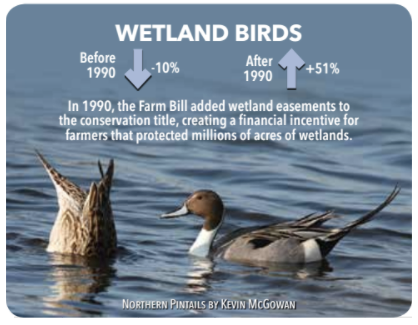Dear Peter,
When you think of the Farm Bill, you probably think of things like corn, soybeans, and farmers. But what if I were to tell you it’s about much more than that? The Farm Bill is actually one of America’s most important pieces of federal conservation legislation -- not just for farmers, but for birds and for you, too!
The Lab was a leader in producing a new State of the Birds report highlighting the importance of the Farm Bill to bird conservation, the economy, and its ecological benefits for all. Through research platforms such as eBird, we are able to monitor bird populations and migration patterns -- the data used to build trend lines that contribute to the report’s findings.
What does Farm Bill mean for bird conservation?
Since the 1990s, the Farm Bill has been one of America’s most important sources of conservation funding, securing and improving habitat for more than 100 bird species on private lands. These conservation programs have helped turn around negative population trends for wetland, grassland, and forest birds. As one example, in the Prairie Pothole region alone, it helped to grow waterfowl populations by 37 million birds in two decades!
How does this help wetland birds?
Farm Bill wetlands provide 34 percent of all duck food energy in the Mississippi Alluvial Valley, which helps feed North American waterfowl populations. This is a critical food source for species such as Northern Pintail, Mallard, and Wood Duck.
How does this affect me?
The Farm Bill grows more than crops, wildlife habitat, and birds. It also encourages and compensates landowners for ecological services. This means cleaner water, reduced risk of flooding, and better soils -- ecological services that result in billions of dollars of net benefits for the entire community.
How do I find out more about the Farm Bill and bird conservation?
Check out the new State of the Birds report focusing on the Farm Bill. You can learn more about bird conservation and the 2018 Farm Bill reauthorization coming soon. The report was published by the North American Bird Conservation Initiative, a coalition of 28 government agencies and nonprofit groups including the Cornell Lab of Ornithology.
Thanks for your support,

Amanda Rodewald
Garvin Professor of Ornithology
Director of Conservation Science
The Cornell Lab of Ornithology